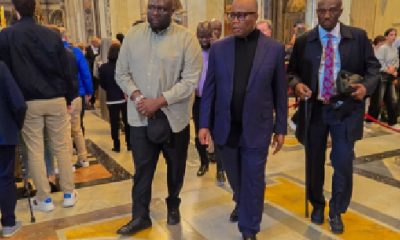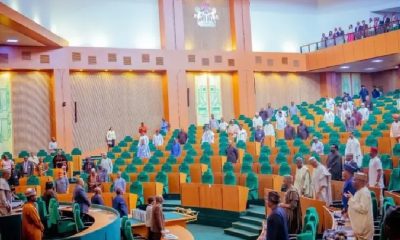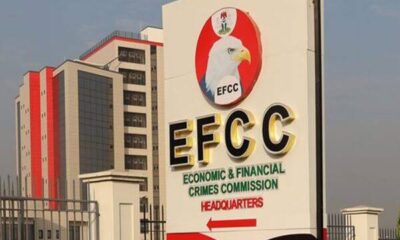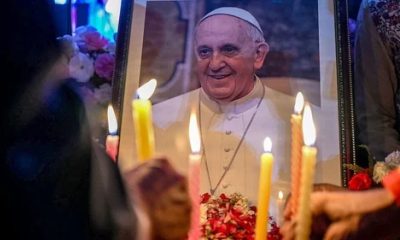Opinion
Internal haemorrhage as threats to telecoms services

By Sonny Aragba-Akpore
Without sounding a death-knell,telecommunications service companies are troubled.
Although,the big players display glamour and pictures of “all is well” what you see is
nothing but a facade as the companies are grasping for breath as a result of the internal haemorhage plaguing their service provision.
And unless government rejigs its policy on foreign exchange as a quick intervention, to cushion importation of equipment to boost services,many of the so called A grade players may go into worst shapes.
Operating Expenditure (OPEX) has more than doubled since 2021 and with dwindling foreign inflows through Foreign Direct Investments(FDIs), some telcos are now holding on to straw to survive.
The operators see their biggest challenges in their inability to provide quality of service and a result of recurrent vandalism of their infrastructure.
Every operator has become its own electricity power provider as supplies from national grid are now a pipe dream.Added to this, the spiral costs of diesel and its alleged incessant theft of same by unnamed persons creates bigger problems.
The rising cost of diesel is very worrisome as a litre that sold between 1200/1400 at pump landing at site is now as high as NGN 2000 per litre on site in some parts of the country.
Confirming the internal haemorhage,in the sector,an official who wants to be anonymous said part of the haemorrhage stems from significant high interconnect debts between players. Telcos are being owed alot of money thereby leading to terminal struggles for survival.
The telcos also list Political incursions as a major drawback hindering survival.
On the issue of Forex sources : “willing seller, willing buyer on forex, problem is bills that are being settled now due to long wait for forext transactions when Forex was at 700N =US1 and now being paid at the prevailing rate of 1,400+
High OPEX remains a major issue coupled with Low FDIs leading to concerns in industry sustainability.
They claim that the regulator is in a dilemma especially on tariff hike issues.
So Telcos are now on bent knees scrapping to provide services below cost.
And the Government looks elsewhere inspite of manifest inflation on every single item especially now that Infrastructure are experiencing decay and to replace same is slow and painful as telcos lament their inability to deliver robust Services .
To underscore a picture of this haemorrhage,
MTN Nigeria and Airtel Africa (the only two telcos publicly traded) lost N479 billion to currency revaluation and recorded reduced profit margins in the first nine months of 2023.
In its financial report for Q1, 2024, for instance,MTN reported a second successive loss after declaring a loss after tax of N392.7 billion for the first quarter of 2024.
This is coming despite growing its service revenue by 32.0 per cent to N747.3 billion year-on-year, the telco recorded its second loss since it was listed on the Nigerian Exchange.
It noted that its net loss for the quarter further increased its accumulated losses and negative shareholders’ funds to N599.2 billion and N434.7 billion, respectively. It highlighted that its profit after tax adjusted for the net forex loss declined by 57.8 per cent to N47.1 billion.
“Further adjusting for the impact of the naira devaluation in OPEX, PAT would have been down by 5.3 per cent to N105.6 billion,” MTN said. The telco’s net foreign exchange loss stood at N656.37 billion.
MTN Nigeria’s chief executive officer, Karl Toriola, noted that severe macroeconomic headwinds overshadowed a solid operating performance. He said: “The operating environment in the first quarter remained very challenging, with rising inflation and continued naira depreciation off an already low base.” He stated that the naira’s devaluation and record-high inflation have impacted the operating environment for businesses in Nigeria.
The operators are agitating for tariff hikes as part of measures to sustain their operating expenditure.But that is half way through if all they get the regulator,s ,Nigerian Communications Commission (NCC)’s nod.
The operators are trying to justify the tariff increase because “Consumer prices in other sectors have seen a steep rise over the last six years as they adjust to reflect macroeconomic realities. However, telco prices have remained flat and even declined. Contrary to the price trends in other sectors, telcos have had to adjust for the macroeconomic headwinds caused by an increasing erosion of margins. Other highly regulated sectors such as power and insurance have implemented price increases over the last year. Insurance prices have risen 200 per cent with power raising prices by over 40 per cent.”
They also decry the strong macroeconomic headwinds which have occasioned tough operating conditions, leading to a decline in CAPEX (Domestic) and Foreign Direct (Capital Inflow) investments into the industry by 30.37 per cent and 46.9 per cent respectively between 2021 and 2022.
These headwinds include inability to source foreign exchange and attract foreign direct investment because investors have become uncomfortable because of the grave economic uncertainty in the country.
Without meaning to link the crisis to a flip flop economy,the operators think unless something urgent is done,providing quality of service will not be sustainable because of the multiple effects of operating costs.
Owing to the macroeconomic crisis , resulting in increased cost of operation and overheads, most telecom companies in Nigeria have been posting losses, making it difficult for them to pay their Annual Operating Levy (AOL) to the Commission as and when due.
The operators are worried about the restrictive regulatory approach which is unconducive for the highly needed innovation in this evolutionary era of newer communication technologies.
“We invite the EVC to note that the convergence of telecommunications with digital and multimedia services has greatly reduced the revenue streams from traditional telecommunications services (voice, SMS, etc.)and to survive this digital era, telecommunications operators have no choice but to quickly evolve into digital and platform service providers which enable newer and advanced means and uses of communications technology and this is only possible in a regulatory environment that enables the development of innovative products and services, with a flexible regulator that is well-informed on the latest technology developments/requisite regulatory frameworks, and an appreciation for the reverberating impact of derailing this progression.” they lamented.
In 2023,MTN declared its first loss after tax of N137 billion. and Its retained earnings and shareholders’ fund fell to negative N208.0 billion and N40.8 billion, respectively.
For Airtel, profit before taxes result for the half-year 2023 was much worse, it dropped by a staggering 97.7 per cent – from $516 million to $12 million – compared to the results from 2022.
The report showed that Airtel had consistently grown its revenue in Nigeria since Q2 2018. The only time there was a drop in revenue between quarters was in 2020 when revenue dropped from $377 million in Q1 2020 to $341 million in Q2 2020. This $36 million drop in revenue is nothing compared to the decline seen in 2023.
Its revenue for Q1 2023 was $543 million, a $2 million drop compared to the previous quarter – $545 million in Q4 2022. By Q2 2022, the drop in revenue increased by $15 million, from $543 million to $528 million.
Although figures of losses sustained by the other unquoted telcos are unavailable,there are strong indications that all is not well.
Several of them are owing interconnect fees and generally unable and or late in payment of AOL.
Consequently,the late and inability to pay AOL to the NCC tells one of the bad stories of the situation on ground.
In general terms,the sector is believed to be wobbling and In fits.
Deposit Money Banks are also part of the telcos headaches as they are believed to be indebted to the tune of about Two hundred billion naira (#200b) in unsettled Unstructured Supplementary Service Bus(USSD) services rendered by telcos to the banks.
The telcos also bemoan the fate of their equipment and infrastructure across the country.
They had canvassed for comprehensive protections for their infrastructure by suggesting to government to make telecommunications equipment Critical National Infrastructure (CNI) but government officials say this is “Work In Progress (WIP) as the telcos wait in limbo.
Apart from these,they have had to contend with multiple taxations whereby the Federal Government,states and council governments put immense pressure on telcos for various taxes at different levels.
Apart from the taxes,Right of Way is an albatross that had defied any solutions and so the telcos have had to live with it.
The telcos say that
“notwithstanding the much-touted resilience of the telecommunications sector and its commendable double-digit contribution to the GDP, we wish to strongly impress on the NCC the pressing need to avert the grave risk looming in the industry’s horizon by taking clinical and definitive action towards repositioning the industry for growth and increased investments, because ultimately , it is our considered view that a thriving telecommunications sector will have a far-reaching effect on:
o Mobile Network Operators as they will remain going concerns who can carry on sustainable operations with the overall intention of value creation and enabling connectedness;
o The maximization of consumer welfare for Nigerians who, as the the NCC rightly noted, are the most critical stakeholders in the telecommunications value chain; and
o The Government itself, given that the net effect of a sustainable communications industry is bolstered investor confidence, increased contribution to GDP and, by extension, revenue growth in the form of payment of increased direct/indirect taxes and Annual Operating Levies” in that regard.
Opinion
CBN under Cardoso and $6.83 Billion balance of payments surplus in 2024 that signals economic resurgence

By Ibrahim Modibbo
Since his appointment as the Governor of the Central Bank of Nigeria, in October 5, 2023, Olayemi Cardoso has continue to bring on board wide-range of macroeconomic reforms, stronger trade performance, and renewed investor confidence in Nigeria’s economy, that were aimed at putting the country back to its economic footing, as a strong economy that is second to none in Africa.
As part of the ongoing reforms, the Central Bank of Nigeria recently announced a Balance of Payments (BOP) surplus of $6.83 billion for the 2024 financial year, marking a decisive turnaround from deficits of $3.34 billion in 2023 and $3.32 billion in 2022, according to a press statement from Mrs Sidi-Ali, Hakama, the Ag. Director, Corporate Communications of the apex bank.
CBN says “the current and capital account recorded a surplus of $17.22 billion in 2024, underpinned by a goods trade surplus of $13.17 billion. Petroleum imports declined by 23.2% to $14.06 billion, while non-oil imports fell by 12.6% to $25.74 billion. On the export side, gas exports rose by 48.3% to $8.66 billion, and non-oil exports increased by 24.6% to $7.46 billion.”
While “remittance inflows remained resilient, with personal remittances rising by 8.9% to $20.93 billion. International Money Transfer Operator (IMTO) inflows surged by 43.5% to $4.73 billion, up from $3.30 billion in 2023, reflecting stronger engagement from the Nigerian diaspora. Official development assistance also rose by 6.2% to $3.37 billion,” the statement added.
Nigeria recorded a net acquisition of financial assets totalling $12.12 billion. Portfolio Investment inflows more than doubled, increasing by 106.5% to $13.35 billion, while resident foreign currency holdings grew by $5.41 billion, indicating stronger confidence in domestic economic stability. Although foreign direct investment fell by 42.3% to $1.08 billion, the overall financial account posted notable gains.
The country’s external reserves increased by $6.0 billion to $40.19 billion by year-end 2024, bolstering its external buffer.
Notably, net errors and omissions narrowed significantly by 79.5% to negative $5.10 billion in 2024, down from $24.90 billion in 2023, reflecting substantial improvements in data availability and capture. This represents a major advance in data accuracy, transparency, and overall reporting integrity.
The 2024 BOP surplus highlights the effectiveness of Nigeria’s ongoing reform agenda. The liberalisation and unification of the foreign exchange market, a disciplined monetary policy approach to managing inflation and stabilising the naira, and coordinated fiscal and monetary measures have all contributed to enhanced competitiveness and investor sentiment.
“The positive turnaround in our external finances is evidence of effective policy implementation and our unwavering commitment to macroeconomic stability,” said the Governor of the Central Bank of Nigeria. “This surplus marks an important step forward for Nigeria’s economy, benefiting investors, businesses, and everyday Nigerians alike,” the statement further noted.
Other notable indicators to building strong economy by this policy include but not limited to a stronger trade performance, particularly in the current and capital accounts, with a surplus of $17.22 billion in 2024, has contributed to the balance of payments surplus. A goods trade surplus of $13.17 billion that will further strengthens the positive trend. The decline in petroleum and non-oil imports also contributes to a more favorable trade balance.
It will noteworthy to note that the CBN’s reforms have increased investor confidence, leading to higher foreign portfolio investment inflows. Portfolio investment inflows more than doubled in 2024, reaching $13.35 billion. This influx of capital indicates a stronger belief in the stability and growth prospects of the Nigerian economy.
The apex bank’s disciplined monetary policy and FX market reforms on the other hand are aimed at managing inflation and stabilizing the Naira, has contributed to a more stable financial system.
The liberalization and unification of the foreign exchange market have led to greater transparency and reduced distortions in the market.
The implementation of an Electronic Foreign Exchange Matching System (EFEMS) further enhances transparency and efficiency in the FX market.
The reforms, including the unification of the exchange rate, have improved Nigeria’s competitiveness and attracted more foreign investment. Testament to this is the clearing of a $7 billion forex backlog which has also boosted the country’s image with foreign investors.
Also, the significant improvements in data availability and capture have led to a marked reduction in net errors and omissions in the balance of payments data. This enhanced data integrity provides a more accurate picture of the country’s economic performance and builds trust with stakeholders.
In conclusion, the combination of strong trade performance, renewed investor confidence, disciplined monetary policy, and improved data integrity, all facilitated by the CBN’s wide-ranging reforms, are key indicators of Nigeria’s economic resurgence. These developments demonstrate the positive impact of the reforms on the nation’s external finances and overall economic stability.
Dr Moddibo, a public analyst, wrote in from Abuja
Opinion
CBN leads financial dialogue with JP Morgan, NGX, others, in pre-spring meetings Forum

By Dr. Ibrahim Modibbo
In anticipation of the International Monetary Fund (IMF) and World Bank Group (WBG) Spring meetings which commenced on Monday, April 21, 2025, the Central Bank of Nigeria (CBN) partnered with J.P. Morgan, the Nigerian Exchange Group (NGX) and Africa Private Capital Association (AVCA) to host a high-profile global forum at Nasdaq MarketSite in New York on Thursday, April 17, 2025, according to press statement by Dr Ibrahim Moddibo.
The forum, titled “The Nigeria Investment Agenda: Pathways for Growth & Global Partnerships,” convened global investors, diaspora leaders, and senior financial stakeholders to examine Nigeria’s macroeconomic prospects and ongoing reform progress.During his commanding address, Governor Olayemi Cardoso outlined his comprehensive reform strategy encompassing monetary tightening, foreign exchange market transparency, and enhanced financial governance.
He emphasized that these initiatives are establishing the foundation for sustainable macroeconomic stability and heralding a new era of transparency and confidence.Governor Cardoso reaffirmed the CBN’s unwavering commitment to rebuilding credibility through orthodox monetary policy, transparency, and consistency.
“We inherited a crisis of confidence but chose a different path. We’re not turning back,” he stated decisively.In a powerful fireside chat between the Governor and Nobel Prize-winning economist Dr. James Robinson, Reverend Richard L. Pearson Professor at the University of Chicago, Governor Cardoso elaborated on his vision to reestablish the CBN as a credible, trusted institution – rooted in domestic excellence and respected internationally.Mr. Muhammad Sani Abdullahi, Deputy Governor for Economic Policy at the CBN, delivered a macroeconomic update highlighting sharp increases in foreign exchange turnover, emerging signs of disinflation, and strengthening external reserves. “With a market-determined exchange rate and a transparent, rules-based policy framework, confidence is gradually being restored in Nigeria’s economy,” he noted.
Welcoming participants to the forum, Dr. Nkiru Balonwu, Adviser to the CBN Governor on Stakeholder Engagement and Strategic Communication, framed the forum as a key moment in the Bank’s broader engagement strategy. “Today is more than a conversation,” she noted.
It’s about opening the books on the CBN’s transformation story under Governor Cardoso – sharing the facts, interrogating the progress, and looking ahead together at what more can be done to build sustainable partnerships and unlock long-term capital,” she explained.
Another key highlight of the event was the panel discussion entitled “Repricing Nigeria: Assessing the Scope for Sustained Change.” Moderated by Gavin Serkin, Founder of New Markets Media & Intelligence, the panel featured global financial luminaries: Joyce Chang, Chair of Global Research at JPMorgan Chase; Jason Rekate, Global Co-Head of Corporate Banking at Citi; Razia Khan, Chief Economist for Africa & Middle East at Standard Chartered; and Ahmad Zuaiter, Co-Founder & CIO of Jadara Capital Partners. Each panelist provided expert perspectives on Nigeria’s investment landscape, noting renewed international interest driven by improved fundamentals, strengthened governance, and clearer policy direction.
The CBN Board and Monetary Policy Committee were represented by US-based diaspora members Mr. Robert Agbede, Prof. Melvin Ayogu, and Dr. Aloysius Ordu, underscoring the Bank’s global engagement and commitment to leveraging Nigerian talent worldwide. Temi Popoola, Group CEO of NGX, moderated the Q&A session, while Dr. Olubukola Akinniyi Akinwunmi, Director of Banking Supervision at CBN, delivered the closing remarks.The forum focused on substantive discussions and future prospects: engaging critical voices, evaluating progress, and identifying requirements for building lasting partnerships and attracting long-term capital. Central to this endeavor is a clear objective: reestablishing the CBN as a credible, trusted institution respected globally and dedicated to excellence at home.
Dr. Ibrahim Modibbo, a public affairs analyst writes from Abuja.
Opinion
Instagram , WhatsApp troubled by antitrust laws

By Sonny Aragba-Akpore
While we are yet to grapple with the fate of Tik Tok which President Donald Trump had asked its parent company Byte Dance of China to divest from it’s American operations or be banned, Meta Group, owners of Instagram and WhatsApp, is troubled over antitrust concerns.
The U.S. Federal Trade Commission (FTC) has taken the group to court over anti competition issues.
Specifically, the FTC wants Meta to divest from its two biggest companies in an antitrust trial that could redefine the future of social media.
And so Meta’s world is troubled as Mark Zuckerberg’s company could be forced to sell Instagram and WhatsApp if it loses the lawsuit that has just begun in the U.S.
The FTC has accused Zuckerberg’s company of having bought both platforms to eliminate competition and maintain a monopoly on social media.
If the court rules against them, it would be a historic blow to the tech giant.
Zuckerberg acquired Instagram in 2012, and then, two years later,(2014) completed his trio by buying WhatsApp.
Facebook is the third leg of the trio and this easily makes the group the largest tech owner in the world.
Although these acquisitions were approved by the FTC itself at that time ,but now this lawsuit seeks to reverse that approval, arguing that the purchase was not for innovation but to “neutralize” emerging rivals like Instagram which was acquired in 2012 and thus take control of the entire market.
The FTC claims that Meta has used its financial muscle to block competition, buying up emerging apps instead of competing with them, and it has been doing this since 2008! Everything is based on 2012 emails where Zuckerberg had expressed concern about Instagram’s rapid growth compared to Facebook’s performance (which was his only app at the time). In those emails, Zuckerberg admitted it was better to buy than to compete. And so he did, acquiring the app years later.
“On the other hand, he also bought WhatsApp, and of course that reinforces the FTC’s accusation. Meta strengthened its control over the digital system, keeping these apps as separate platforms but under the same power structure” analysts reason.
Meta has not denied the purchases, even though it rejects having acted in an anti-competitive way, calling the case a “weak lawsuit that ignores reality,” since they believe they face strong competition from platforms like TikTok, YouTube or X among many other apps.
During the trial, Zuckerberg claimed he bought Instagram for its camera technology, not because the social network was on the rise, but the 2012 messages don’t seem to support that statement very well.
In the likelihood that FTC wins this case, Meta could be forced to sell Instagram, WhatsApp, or both. This wouldn’t necessarily mean an immediate change for users, but it would shift the balance in the digital market, according to experts.
Digital sociologists think that Meta would make it easier to regulate social networks individually by the FTC.
One of the major implications will be on things like content moderation, privacy, or the use of personal data.
“If it gets split, it would be easier for lawmakers, ensuring proper service to users” digital sociologists admit.
There are however fears of who buys if it gets to that .
For instance If a controversial figure like Elon Musk or an investment fund takes control of Instagram, like what happened with Twitter (now X), it’s possible that many users would leave in large numbers for new alternatives that may emerge, like BlueSky.
“But if it falls into the hands of a discreet company, without major visible changes, it’s likely that most people will keep using it as they always have.”
Although Meta does not reveal exactly how much it earns from each app, it is estimated that Instagram generates around $37 million a year, surpassing Facebook’s revenue according to analysts.
“So of course, Zuckerberg’s eagerness to get out of this case is clear: they can’t afford to lose that income because it would be a catastrophe for Meta” another analyst submits.
The expectations are dicey because the court’s decision will not only affect Meta, but could also open the door to more lawsuits against other big platforms for similar monopoly practices. And at a time when the control of social networks is more questioned than ever, this case could define the future of the digital system in terms of free choice and regulations.
Instagram and WhatsApp which were acquired over a decade ago have become social powerhouses and easily the biggest platforms in that genre.
This looming antitrust trial will be the first big test of President Trump’s Federal Trade Commission’s ability to challenge Big Tech.
The lawsuit was first filed against Meta — then called Facebook — in 2020, during Trump’s first term. It claims the company bought Instagram and WhatsApp to squash competition and establish an illegal monopoly in the social media market.
FTC contends that Meta has maintained a monopoly by pursuing CEO Zuckerberg’s strategy, “expressed in 2008: ‘It is better to buy than compete.’ True to that maxim, Facebook has systematically tracked potential rivals and acquired companies that it viewed as serious competitive threats.”
U.S. antitrust laws are enforced by both the FTC’s Bureau of Competition and the Antitrust Division of the Department of Justice. The agencies consult before opening any investigation. The Antitrust Division handles all criminal antitrust enforcement.
The FTC,s Bureau of Competition enforces the nation’s antitrust laws, which form the foundation of a free market economy.
The antitrust laws promote the interests of consumers; they support unfettered markets and result in lower prices and more choices.
The Federal Trade Commission Act and the Clayton Act, both passed by Congress in 1914, give the Commission authority to enforce the antitrust laws.
These laws prohibit anticompetitive mergers and business practices that seek to prevent hard-driving competition, such as monopolistic conduct, attempts to monopolize, and conspiracies in restraint of trade.
The Bureau of Competition investigates potential law violations and seeks legal remedies in federal court or before the FTC’s administrative law judges. The Bureau also serves as a resource for policy makers on competition issues, and works closely with foreign competition agencies to promote sound and consistent outcomes in the international arena.
WhatsApp (officially WhatsApp Messenger) is an American social media, instant messaging (IM), and voice-over-IP (VoIP) service owned by technology conglomerate Meta. It allows users to send text, voice messages and video messages, make voice and video calls, and share images, documents, user locations, and other content.
WhatsApp’s client application runs on mobile devices, and can be accessed from computers.
The service requires a cellular mobile telephone number to sign up.
In January 2018, WhatsApp released a standalone business app called WhatsApp Business which can communicate with the standard WhatsApp client.
The service was created by WhatsApp Inc. of Mountain View, California, which was acquired by Facebook in February 2014 for approximately US$19.3 billion.
It became the world’s most popular messaging application by 2015,and had more than two billion users worldwide by February 2020,confirmed four years later by 200 million new registrations per month.
By 2016, it had become the primary means of Internet communication in regions including the Americas, the Indian subcontinent, and large parts of Europe and Africa.
Instagram is an American photo and short-form video sharing social networking service owned by Meta Platforms. It allows users to upload media that can be edited with filters, be organized by hashtags, and be associated with a location via geographical tagging.
Posts can be shared publicly or with preapproved followers. Users can browse other users’ content by tags and locations, view trending content, like photos, and follow other users to add their content to a personal feed.
A Meta-operated image-centric social media platform, it is available on iOS, Android, Windows 10, and the web. Users can take photos and edit them using built-in filters and other tools, then share them on other social media platforms like Facebook.
It supports 32 languages including English, Hindi, Spanish, French, Korean, and Japanese.
Instagram was originally distinguished by allowing content to be framed only in a square aspect ratio of 640 pixels to match the display width of the iPhone at the time.
In 2015, this restriction was eased with an increase to 1080 pixels. It also added messaging features, the ability to include multiple images or videos in a single post, and a Stories feature—similar to its main competitor, Snapchat, which allowed users to post their content to a sequential feed, with each post accessible to others for 24 hours.
As of January 2019, Stories were used by 500 million people daily.
Instagram was launched for iOS in October 2010 by Kevin Systrom and Mike Krieger. It rapidly gained popularity, reaching one million registered users in two months, 10 million in a year, and one billion in June 2018.
In April 2012, Facebook acquired the service for approximately US$1 billion in cash and stock. The Android version of Instagram was released in April 2012, followed by a feature-limited desktop interface in November 2012, a Fire OS app in June 2014, and an app for Windows 10 in October 2016.
Although often admired for its success and influence, Instagram has also been criticized for negatively affecting teens’ mental health, its policy and interface changes, its alleged censorship, and illegal and inappropriate content uploaded by users.
-

 News9 hours ago
News9 hours agoAkpabio arrives Vatican ahead Pope’s funeral
-

 News6 hours ago
News6 hours agoDefections: Teejay Yusuf traces genesis of PDP palaver, key issues affecting Nigeria’s largest opposition party
-

 News19 hours ago
News19 hours agoRivers State is yet to fully stabilise– Ibas
-

 News22 hours ago
News22 hours agoOsun PDP Reps Dismiss Defection Claims, Pledge Support for Adeleke
-

 News8 hours ago
News8 hours agoCBEX: EFCC declares four persons wanted over crypto fraud + photos
-

 News2 hours ago
News2 hours agoList of World Leaders that are present in the final funeral of Pope Francis
-

 News22 hours ago
News22 hours agoKalu Rallies South East to Embrace Centre for Greater National Gains
-

 News8 hours ago
News8 hours agoScandal! Osun monarch, pastor admit to COVID-19 fraud in US






